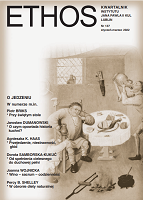O CZYM OPOWIADA HISTORIA KUCHNI? PAUL TREMO, KUCHARZ WIEKU FI LOZOFÓW
WHAT DOES THE HISTORY OF COOKING TELL US? ON PAUL TREMO, A CHEF IN AN AGE OF PHILOSOPHERS
Author(s): Jarosław DUMANOWSKISubject(s): Cultural history, Social history, Cultural Anthropology / Ethnology, 17th Century, 18th Century
Published by: Katolicki Uniwersytet Lubelski Jana Pawła II - Instytut Jana Pawła II, Wydział Filozofii
Keywords: Cuisine; food; Age of Enlightenment; cookery literature;
Summary/Abstract: Paul Tremo was the chef of Stanisław August Poniatowski and the organizer of the famous “Thursday dinners.” As a person close to the monarch, he played a specifi c role at the court, going beyond just managing the kitchen. He was the author of a collection of recipes remaining in the manuscript form and of a treatise on food preservation published in 1794. He combined French ideas of good taste, modern culinary techniques and the liberalization of fasting with Polish culinary traditions. He contributed to the fi nal abandonment of the baroque canon of contrasting taste, oriental exoticism, strict fasting, and humoral dietetics. As “Polish,” he presented dishes inspired by the French à la polonaise and à la Stanislas cuisine, related to the Lorraine court of King Stanisław Leszczyński. This French culinary style has been accepted in Poland as an element of national cuisine. He was interested in biology and chemistry, read the works of Enlightenment authors, met and discussed with scientists. He was looking for new food products that could avert famine, and he worked on ways to preserve food. His activity shows an apparent, sentimental cult of nature and a sense of the Enlightenment’s practical mission of the chef.
Journal: Ethos. Kwartalnik Instytutu Jana Pawła II KUL
- Issue Year: 35/2022
- Issue No: 1
- Page Range: 53-80
- Page Count: 28
- Language: Polish
- Content File-PDF

